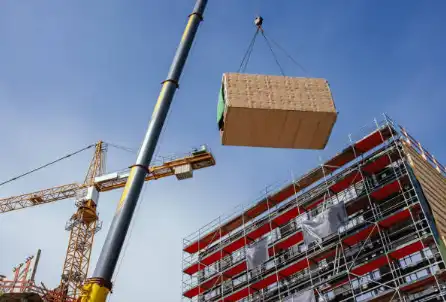When you think of construction, you typically think of brick and mortar, alongside busy and noisy construction sites, but is this the future for the industry?
According to Business Wire, ‘The construction industry in the United Kingdom is expected to grow by 14.1% and reach GBP 166,765 million in 2022’ and sustainability innovation is expected to further boost growth within the industry.
The UK Government has recently granted £10m to drive the adoption of Modern Methods of Construction. Modern Methods of Construction (MMC) consists of a few different methods including; modular construction, steel framed structures, pre-fabricated buildings and timber frames, just to name a few. The Government have implemented these grants with the view that it will accelerate the delivery of MMC homes in the UK, bringing many benefits. As a result of this push and Government grant incentive, the construction industry has taken a drive towards sustainability and innovation with these methods being favoured for a few reasons.
Arguably, the most popular method is modular construction. Modular construction is the process that uses prefabricated elements, which are assembled in a factory or manufacturing facility which are then transported to the site either entirely or mostly complete. This holds many benefits when compared to Traditional Construction methods, as modular construction is considered to be a lot ‘greener’.
In 2022, there is a strong focus on creating net-zero carbon houses, according to Buildoffsite 2022“unless more homes are built in factories, we won’t meet net-zero or new housebuilding targets”. There are two benefits of this, the first being that it is more energy efficient to actually construct, and secondly these buildings are more energy efficient to run and live in. The modules are composed of energy efficient and well insulated materials meaning they are much more sustainable than traditional houses. Therefore, MMC is vital for the construction industry to play it’s part in helping reduce carbon emissions. As reported by Construction Digital, ‘when compared to traditional construction methods, modular construction reduces energy consumption during the building process by around 67%.’This is because, it is much more energy efficient to produce modular buildings, it creates a lot less waste due to the process being conducted in a controlled environment. There is also significantly less disruption to the environment because of this.
Another major benefit of modular construction is that it is a much quicker and much cheaper way to construct, with it leading to a 30-50% reduction in total build time. This is contributing to help solve the housing crisis. The Government set a target to create 75,000 new modular homes per year by 2030 to contribute to the overall target to construct 300,000 new houses by 2025. This is possible due to its streamlined process, leading to an average time of 9 weeks. In comparison, a traditional house usually takes around 6 to 12 months.
This has resulted in the UK seeing many large traditional construction companies, in both the residential and commercial sector, change and adapt the way they are constructing. Whilst some companies are still choosing to construct in the traditional way, there is a notable increase in the use of MMC. To conclude, the construction industry still has a long way to go to reach its targets, but it looks like this is going to be possible over the coming years with the use of Modern Methods of Construction.












